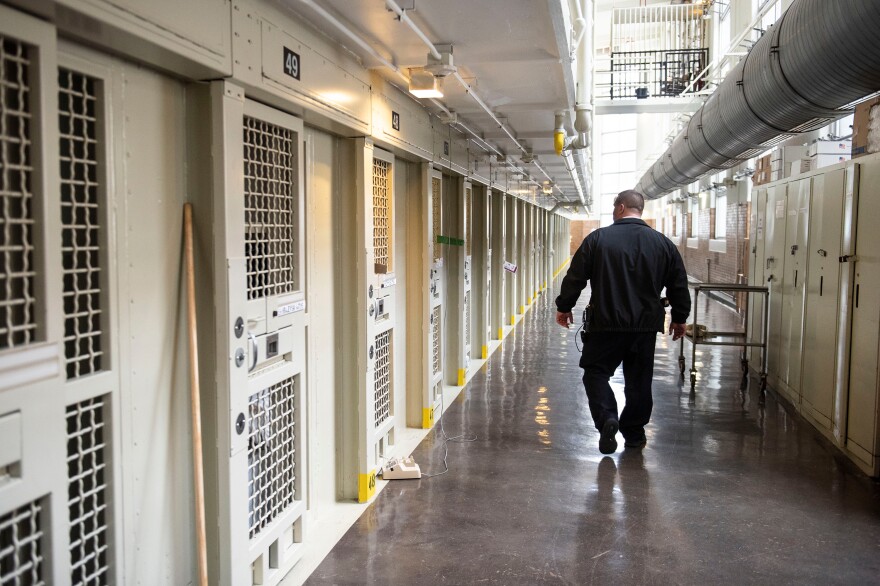The proposed overhaul to Arkansas’ criminal sentencing and parole system moves in the opposite direction of several surrounding states and most of the U.S. and world.
Facing a growing body of research that more incarceration does not lower violent crime rates, policymakers elsewhere have focused on criminal justice measures that reduce the number of offenders in prison.
But the “truth in sentencing” legislation approved by the Arkansas Senate along party lines on Monday aims to increase the time those convicted of the state’s most serious offenses spend behind bars.
Supporters of the bill, like sponsor Sen. Ben Gilmore and Attorney General Tim Griffin, point to what they’ve said is common sense: lock up violent offenders to “incapacitate” them and prevent further public harm.
They’ve pointed to several high profile crimes, including the killing of an Arkansas police officer last year, committed by people with violent pasts.
“This bill will make Arkansas safer,” Gilmore, a Republican from Crossett, told senators on Monday.
But critics have pointed to studies that indicate long sentences in American prisons often do just the opposite over time, increasing the chance that inmates will reoffend after release.
Additionally, Arkansas’ incarceration rate is already among the top five highest in the U.S. The state imprisons more than 550 people per 100,000 residents, a significantly higher rate than any other democratic country in the world.
Democratic Sen. Clarke Tucker, opposing the bill on the Senate floor Monday, pointed to states like Missouri and Texas, which have focused on strengthening their post-release supervision systems and reducing prison populations.
The Little Rock attorney noted that Arkansas has a high average prison term and prison population, yet he said crime rates have continued to increase in the state since the early 2000s.
During a Senate Judiciary Committee hearing on the legislation last week, Tucker said the state has already tried locking criminals up for longer times as a solution.
“Instead of trying to figure out alternatives we’re just pulling that lever even harder,” he said.
The Protect Arkansas Act proposes overhauling Arkansas’ parole system, abolishing automatic parole eligibility. Instead, it would increase the amount of time most offenders must spend behind bars and require them to earn credits before being considered for early release.
The minimum percentage of a prison term an inmate must serve under the legislation depends on the seriousness of the offense.
For the most serious offenses — like capital murder, rape and aggravated robbery — 100% of the prison sentence must be served.
The next level of offenses will require 85% of the prison sentence to be served before eligibility for early release, and the final two tiers would require 50% and 25% of time in prison served, respectively.
Under current law, inmates convicted of the most serious crimes that still have the opportunity for parole must serve 70% of their sentences; offenders convicted of the least serious offenses can be eligible for parole after serving a sixth of their prison sentences.
The legislation also changes the name of the Parole Board to the “Post-Prison Transfer Board” and parole to “post-release supervision” or “community supervision.”
Additionally, it changes Arkansas’ bail laws, has measures intended to smooth offenders’ reentry into society after incarceration and other provisions aimed at decreasing recidivism.
For a full breakdown of the bill, read our explainer.
The bill was introduced a week ago along with an announcement from Gov. Sarah Huckabee Sanders that the state will seek to build a new, 3,000-bed prison — an expansion from the 1,000-bed facility for which site selection began last year.
In addition to taking violent people off the street, Griffin has said the Protect Arkansas Act would discourage future crime.
People aren’t worried about long prison sentences in Arkansas right now, the attorney general said, but once word spreads about truth in sentencing, would-be offenders will be afraid of going to state prison the same way he says they’re afraid of federal prison, where violent inmates have been required to serve 85% of their sentence behind bars since the mid-90s.
“They’re not scared of our system,” Griffin said last week.
Opponents are skeptical. Criminals, they said, aren’t considering the state’s criminal code and punishments when committing crimes, and solutions should focus on the root causes of crime, like poverty, education, access to health care and other social problems.
Speaking about the need for the bill, Gilmore said Arkansas’ prison system is a “revolving door,” releasing too many inmates early.
The legislation, he said, has the challenge of punishing violent criminals while improving programs and opportunities to turn their lives around and successfully reintegrate into society.
“I think this bill strikes a balance,” Gilmore said.
The bill next goes to the House where it has a groundswell of support and is expected to pass by the end of the week.



